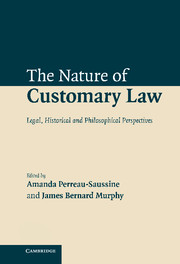Book contents
- Frontmatter
- Contents
- List of contributors
- Table of cases
- The character of customary law: an introduction
- Part I Custom and morality: natural law, customary law and ius gentium
- 1 Pitfalls in the interpretation of customary law
- 2 The moral role of conventions
- 3 Habit and convention at the foundation of custom
- 4 Custom, ordinance and natural right in Gratian's Decretum
- 5 Vitoria and Suarez on ius gentium, natural law, and custom
- 6 Custom and positivity: an examination of the philosophic ground of the Hegel–Savigny controversy
- Part 2 Custom and law: custom, common law and customary international law
- Index of names
3 - Habit and convention at the foundation of custom
Published online by Cambridge University Press: 30 June 2009
- Frontmatter
- Contents
- List of contributors
- Table of cases
- The character of customary law: an introduction
- Part I Custom and morality: natural law, customary law and ius gentium
- 1 Pitfalls in the interpretation of customary law
- 2 The moral role of conventions
- 3 Habit and convention at the foundation of custom
- 4 Custom, ordinance and natural right in Gratian's Decretum
- 5 Vitoria and Suarez on ius gentium, natural law, and custom
- 6 Custom and positivity: an examination of the philosophic ground of the Hegel–Savigny controversy
- Part 2 Custom and law: custom, common law and customary international law
- Index of names
Summary
Introduction: a circle of concepts: nature, custom, stipulation
Philosophical jurisprudence, from Plato to Hans Kelsen, rests upon three fundamental concepts of order and three allied concepts of law: the order intrinsic to human nature grounds the natural law, the order found in informal social practices grounds the customary law, and deliberately stipulated order grounds enacted law. As with many sets of foundational concepts, these are often defined or at least described in terms of each other. This set of analogies and disanalogies between nature, custom, and deliberate stipulation forms the deep structure of traditional philosophical jurisprudence: they are the conceptual lenses and tools by which philosophical analysis of law has proceeded. The history of philosophical jurisprudence reveals how rare it is to examine the lenses by which we see and the tools by which we dissect.
Sometimes customary habits are compared to natural instincts because they operate spontaneously, automatically, and tacitly. Custom here means a kind of second nature: our customary habits operate as unobtrusively as our breathing. In this sense, custom is like natural instinct except that it is learned in a particular social context. Yet custom is also described as a set of informal conventions, a set of practices of social coordination that arise from informal agreements without being imposed by enacted law. Custom here is an unwritten law: customary conventions differ from enacted conventions only by not being deliberately imposed.
Custom, in short, must be analyzed into two more basic notions: habit and convention.
- Type
- Chapter
- Information
- The Nature of Customary LawLegal, Historical and Philosophical Perspectives, pp. 53 - 78Publisher: Cambridge University PressPrint publication year: 2007
- 16
- Cited by

